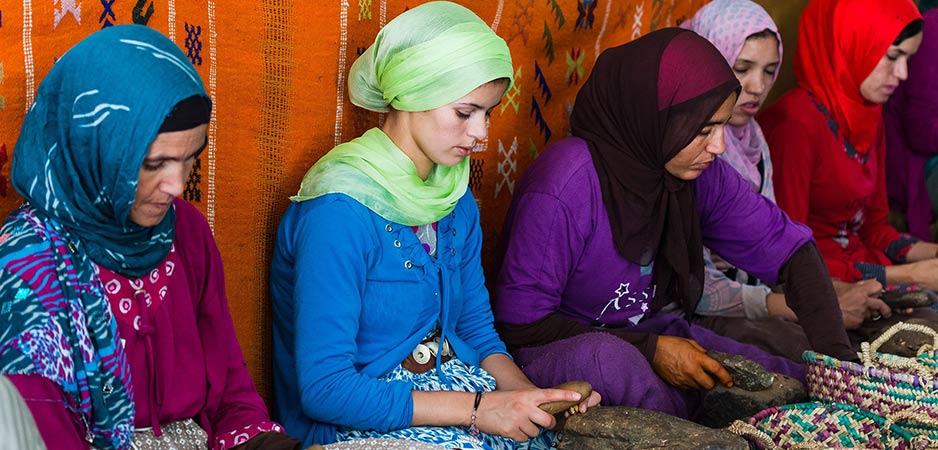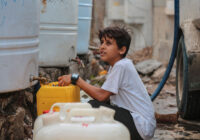For many people, July 6 marked the passing of just another Saturday. But to over 1 billion people, it was of tremendous significance as it was the 25th UN International Day of Cooperatives.
Over 12% of humanity contribute to one of the 3 million cooperatives on the planet. Cooperatives not only stimulate local economies, but also act as a vehicle for bringing opportunity and profit to people worldwide, who otherwise would not be actors in the formal sector of the economy. This tangible empowerment is perhaps best embodied by the Cooperative Aboghlo Women of Ourika in Morocco.
Cooperative Aboghlo
Just a 30-minute drive outside of Marrakech to Tnine Ourika in the Al Haouz province, situated across the street from a furniture retailer is a deceivingly unremarkable storefront. Peering through the glass display case you will find packages of couscous and dried herbs sitting alongside bowls overflowing with chocolate, pistachio, almond and walnut cookies. All of which is made from local Moroccan ingredients.
But this is not the real gem found inside the Cooperative Aboghlo. The true beauty is hidden away on the second floor of the co-op, where 23 women sit in circles and talk back and forth. They are not making casual conversation. Instead, they are debating various aspects of the internal and external marketing for their cooperative enterprise. For hours, these women engage in conversations about how to better spread the word about their product, how to enforce the timeliness of each respective worker, and how to resolve problems of communication and organization — issues every business must grapple with.
This in itself is remarkable, but it is even more so when one is reminded of the context. The discrepancy in opportunities and education of women compared to men is widely experienced throughout the world. This creates an uneven playing field for women. From the time they are little girls, females are not given the same support as their male counterparts.
The consequences are crippling. Unemployment rates among young women in the Middle East and North Africa (MENA) are 80% higher than that of young men. This is compared to the average gender differential of 20% worldwide, according to Brookings. Most women in Cooperative Aboghlo could not read or write, but now they are taking literacy classes at the co-op and are able to write their names and read street signs.
When considering these astonishing circumstances, it is obvious these women, who are successfully managing their own well-established cooperative, are extraordinary exceptions. But that should not be the case. It is just and right to commend the women of this enterprise, but the ladies of the Cooperative Aboghlo are a much-needed reminder not only of what is possible but of what should be.
The cooperative started in October 2016 with 10 women from one village. Now, there are 33 women from five different villages actively participating. In addition to selling various products from their brick-and-mortar site, the co-op exports directly to internationally-recognized cosmetic companies. These women set an example of what is possible when given education and opportunity.
Women and the Economy
Women’s active participation in the labor force can have a tremendous, positive impact on the developing economies of Morocco and other MENA states. In 2015, McKinsey Global Institute found that supporting women’s economic advancement could add $12 trillion to global GDP by 2025 and grow the MENA region’s economy by 85%. Closing the gap between men and women in hours worked per day could lead to a 47% increase in the annual GDP of the Middle East and North Africa.
The root of the issue of female participation in the workforce lies in cultural obstacles. Family opposition and traditional gender roles create rigid barriers for women. This is especially the case in rural regions, where their domain is often confined to that of domestic life.
However, globalization and increased pushes for equality have ushered in a new wave of changes. Moudawana, the Moroccan family code, addresses gender equality and rights by raising the minimum legal age of marriage and limiting divorce and polygamy terms, thus giving back the innate rights of women that have long been forgone. Morocco has reduced the barriers to entry for cooperatives, further encouraging women’s involvement in the economy. This is a huge step forward for Morocco in addressing the systemic inequalities that are so deeply integrated.
This progress, though commendable and remarkable, is just the first step. The path to sustainable development and equality is one that is not easily achieved. Through its partnership with the High Atlas Foundation, a Moroccan nongovernmental organization, Cooperative Aboghlo was given a platform and the skills training necessary to grow tremendously. The cooperative embodies what is possible with this support and facilitation of development.
The time for these changes is long overdue. The time for these changes is most certainly now. It starts with the simplest action. It starts with the women of Cooperative Aboghlo Women of Ourika taking initiative and, most importantly, with the education of marginalized people.
The future should not be a mere continuation of the past. It takes a single lifetime of empowered women to spurn generations of empowered girls.
The views expressed in this article are the author’s own and do not necessarily reflect Fair Observer’s editorial policy.
Support Fair Observer
We rely on your support for our independence, diversity and quality.
For more than 10 years, Fair Observer has been free, fair and independent. No billionaire owns us, no advertisers control us. We are a reader-supported nonprofit. Unlike many other publications, we keep our content free for readers regardless of where they live or whether they can afford to pay. We have no paywalls and no ads.
In the post-truth era of fake news, echo chambers and filter bubbles, we publish a plurality of perspectives from around the world. Anyone can publish with us, but everyone goes through a rigorous editorial process. So, you get fact-checked, well-reasoned content instead of noise.
We publish 2,500+ voices from 90+ countries. We also conduct education and training programs
on subjects ranging from digital media and journalism to writing and critical thinking. This
doesn’t come cheap. Servers, editors, trainers and web developers cost
money.
Please consider supporting us on a regular basis as a recurring donor or a
sustaining member.
Will you support FO’s journalism?
We rely on your support for our independence, diversity and quality.






